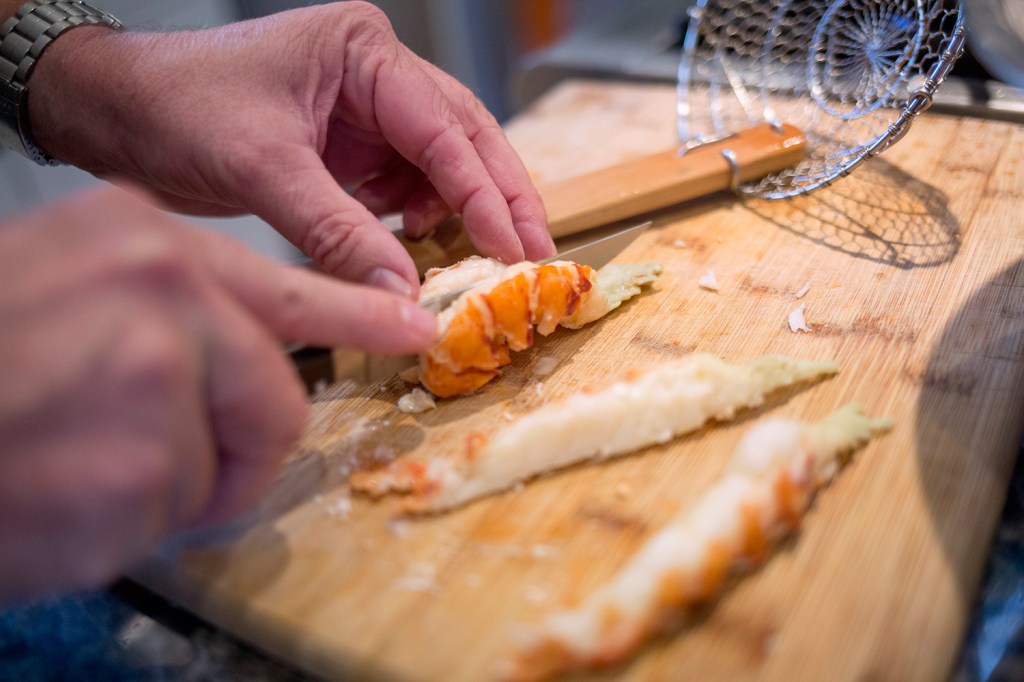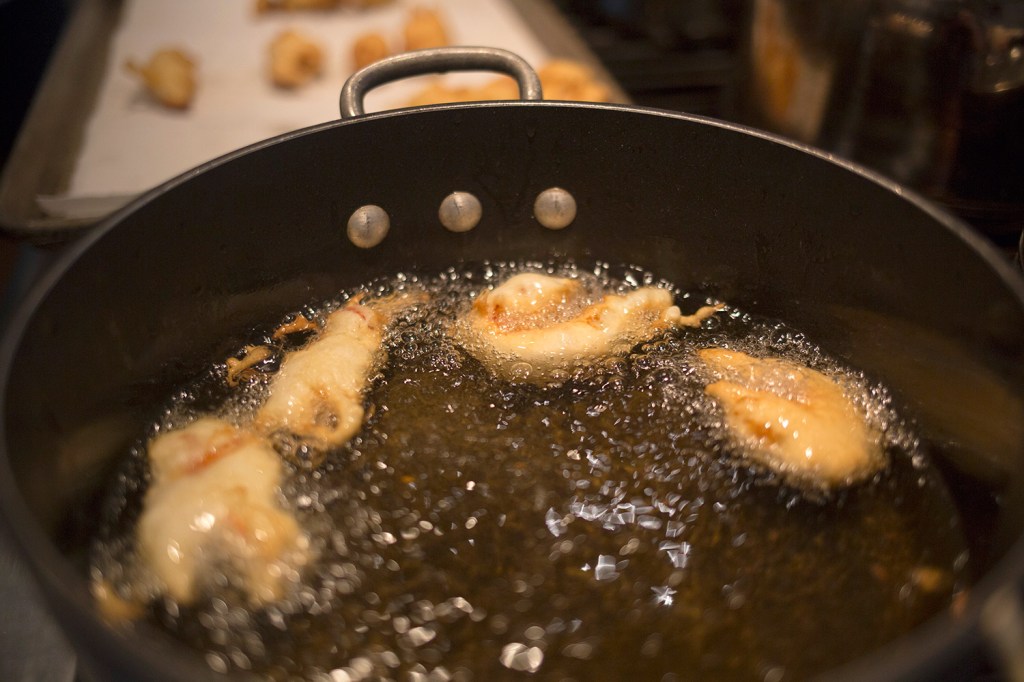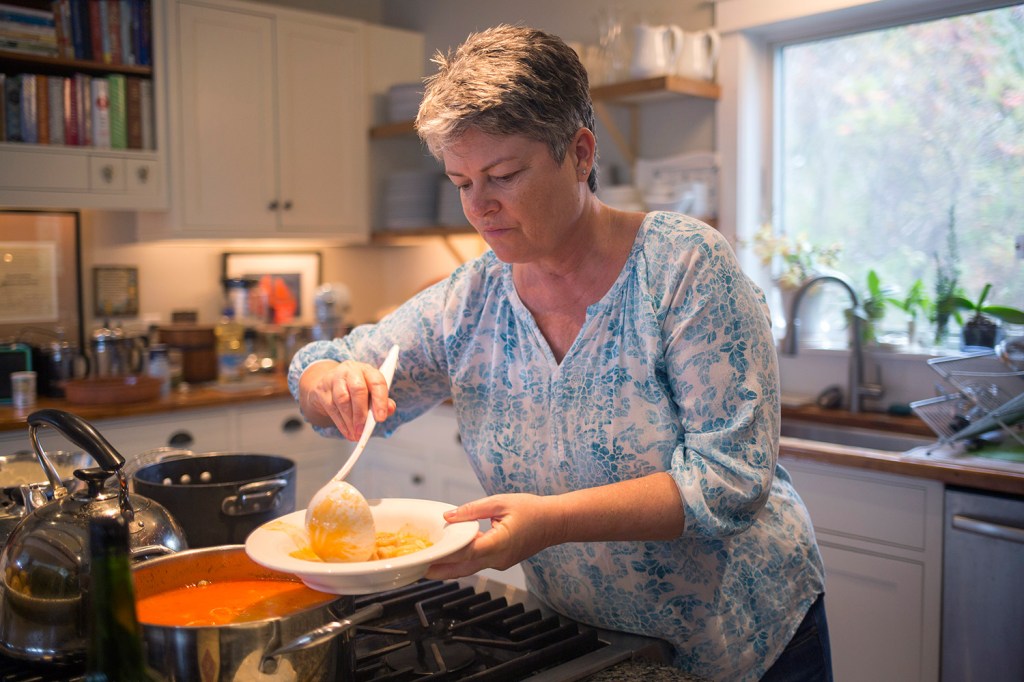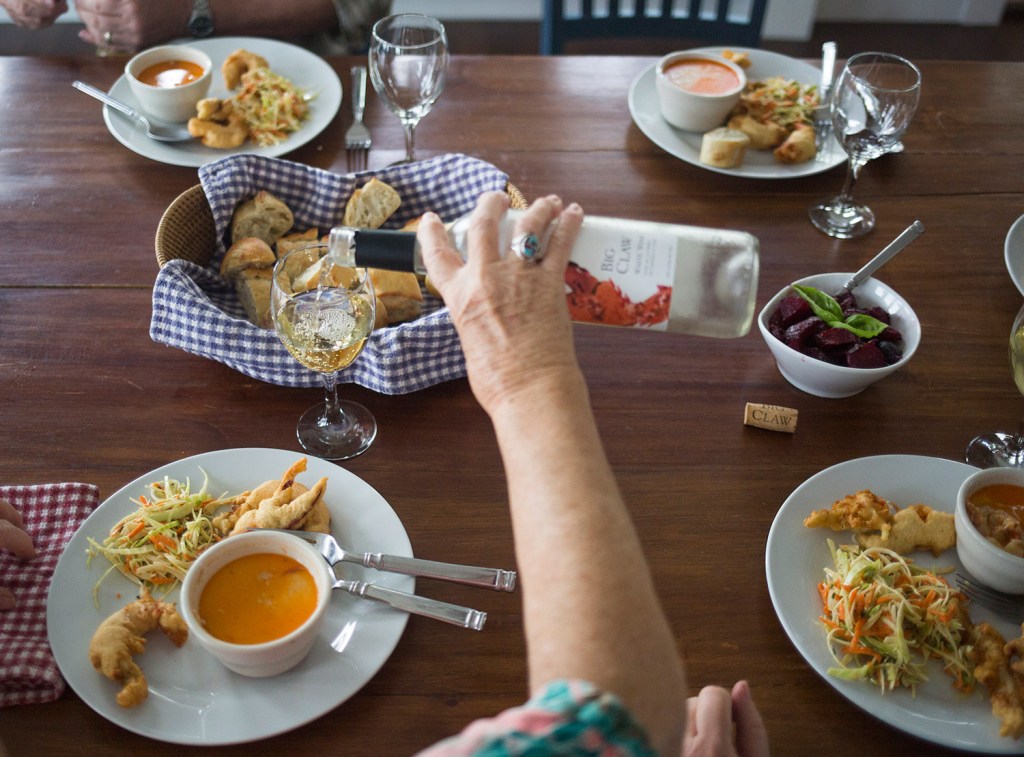BAILEY ISLAND — Brett Johnson gently lowered two pieces of batter-covered lobster tail into a pan of hot oil, and they sizzled in a way that seemed unnatural. That can’t be right, a voice bellowed inside my head. Lobster, I knew from nearly 30 years of living in Maine, is steamed or boiled or sautéed – why is it sizzling?
It will be tough, my mind protested silently. It will be greasy. It will taste like a chicken finger.
None of that was true. When the Johnson family finally gathered at the dinner table and dug into their fried lobster, served with slaw and a cup of seafood chowder, the golden pieces of fried lobster claws and tails were tender, decidedly not greasy, and the lobster taste wasn’t overwhelmed by batter.
People have tried to interfere with the frying of the lobster before, wanting to add a spice here, a little extra flour there, but Johnson will have none of it. “Step away from the batter,” he tells those friends. “I am channeling my nana.”
Nana is Eileen Johnson, who in the 1950s owned the rustic Rock Ovens restaurant, where Morse’s Cribstone Grill sits now. She is Johnson’s grandmother. Fried lobster, and a wide variety of other fried seafood, was on the menu at Rock Ovens.
Eileen was married to Capt. Lawrence E. Johnson, a lobsterman who fished until he was into his 80s. Between the two of them, Johnson and his siblings’ Maine roots run as deep as a canyon in the North Atlantic. Brett Johnson, an interior designer who lives in Portland; his older sister Cathy Silva, who lives in Port Charlotte, Florida; and brother Chris Johnson, who lives on Great Island, are 16th- or 17th-generation Mainers on the Johnson side. Eileen Johnson, who was born a Shea, traced her Maine roots back to the late 1800s.
Eileen Shea’s father, Jeremiah, was a stonemason who raised his family on Little Island, a tiny island off of Orrs Island. Eileen worked at her sister-in-law’s boarding house on Bailey Island and was a “hash slinger” at the Merritt House, which took in guests from the steamships that arrived from Portland. Millie Johnson, Eileen’s daughter-in-law, recalled her as “a character” who liked to drink beer.
Brett Johnson said she reminded him of “Dirty Sally,” the cantankerous frontierswoman from the old TV series Gunsmoke. “Not that she was rough and tumble, but she was wry and witty and definitely had a little bit of a raunchy side,” he said.
Growing up, Brett Johnson and his siblings spent the kind of summers kids dream about at their grandparents’ house. When they weren’t working as sternmen on their grandfather’s boat, Nana took them strawberry and blueberry picking, and they hunted for dandelions. She fed them chicken and dumplings, and lobster hash from a cast iron skillet. None of the kids remember her restaurant – she was out of the business before they reached the age of remembering – but they do fondly recall walking into the kitchen and seeing their grandfather knitting lobster trap heads at the kitchen table while Nana cooked.
“There was always something really good in the refrigerator,” Brett Johnson said. “Literally, you’d go to the refrigerator and see what was in there for leftovers before you’d even say hello.”
Capt. Johnson noticed his grandson’s predilection for leftovers and nicknamed him GG – for “garbage gut.”
Brett Johnson said his grandmother would ferment anything. “There was always a crock of something fermenting in the backyard – pickles or dandelion wine,” he said.
She salted fish as well. “The clothesline was always full of dried fish,” Brett Johnson said.
Before she died, Nana gave her granddaughter Cathy an old trunk that had been in the attic. Inside, Silva discovered an old, handmade “diploma” dated 1955, a “Doctorate of Culinary Arts” bestowed upon Eileen Johnson by a group of English professors from Bowdoin College. The professors were regulars at the Rock Ovens restaurant, and obviously loved her cooking.
The diploma reads in part:
“Be it known to all men by these presents, that we, the undersigned Board of Goliardic Examiners, after consideration, fitting discussion, and mature digestion of her many varied works of gastronomical delectation, relishing her comfortable sustenance of body and spirit, and with cordial appreciation… do hereby award to Eileen Johnson of Rock Ovens, Bailey Island, Harpswell, Maine, the degree of Doctor of Culinary Arts, the same to be had and held by her, friend of gourmets, sustainer of learning, and patroness of professors of English, with all rights, honors and privileges thereunto appertaining…”
It’s fortunate that Silva got the trunk when she did, because the Johnsons’ home burned down in the 1990s, taking with it family photos and heirlooms. The property sat for years until the Johnson grandchildren, around 2009, decided to form a trust and rebuild the house, this time higher on the hill to capture a better water view. They named it the Capt. Lawrence E. Johnson House and now rent it out in the summer and use it as a family retreat.
When Brett and Chris Johnson finished with the renovations and interior design, they asked their sister to scan a copy of their Nana’s honorary culinary arts degree so they could frame it and hang it in the new kitchen. When Silva removed the document from the frame in order to do so, she discovered, hidden in the back, an old newspaper column that included their grandmother’s recipe for fried lobster. The column, called “The Valley Pantry” and written by Cynthia McKee, described McKee’s vacation in Maine and how she and her family ate lobster every day. The Johnsons have been unable to nail down what newspaper the column ran in, but think it may have been published in the Midwest. McKee wrote that the family tried all the restaurants in the Bailey Island area, but Rock Ovens was their favorite.
“There I was introduced to fried lobster, and after I ate it once, I was lost – I had it for dinner every night afterward,” McKee wrote.
McKee noted that the restaurant offered lobster fried in either batter or butter, but she preferred the batter. Eileen Johnson told McKee that the fried lobster recipe had been given to her by her sister-in-law, who got it from her mother.
Brett Johnson is the only one of his generation who remembers his grandmother making fried lobster. But once the siblings discovered the recipe, of course they had to try it. Now Brett Johnson often makes it for his friends at dinner parties. He serves it plain, but wonders if a dipping sauce might work well with it – “maybe a really buttery aioli,” he suggests. His sister likes the idea of a sriracha aioli.
Eileen Johnson died in 1987, at the age of 69. Sitting around the new dining room table, the family pointed out that a lot of their family history was “just gone” after the fire, which makes re-creating their Nana’s fried lobster “even more special.”
“A lot of our memories are around cooking,” Brett Johnson said, “and certainly around…
“Eating!” they all chimed in in unison. And they laughed.
Send questions/comments to the editors.










